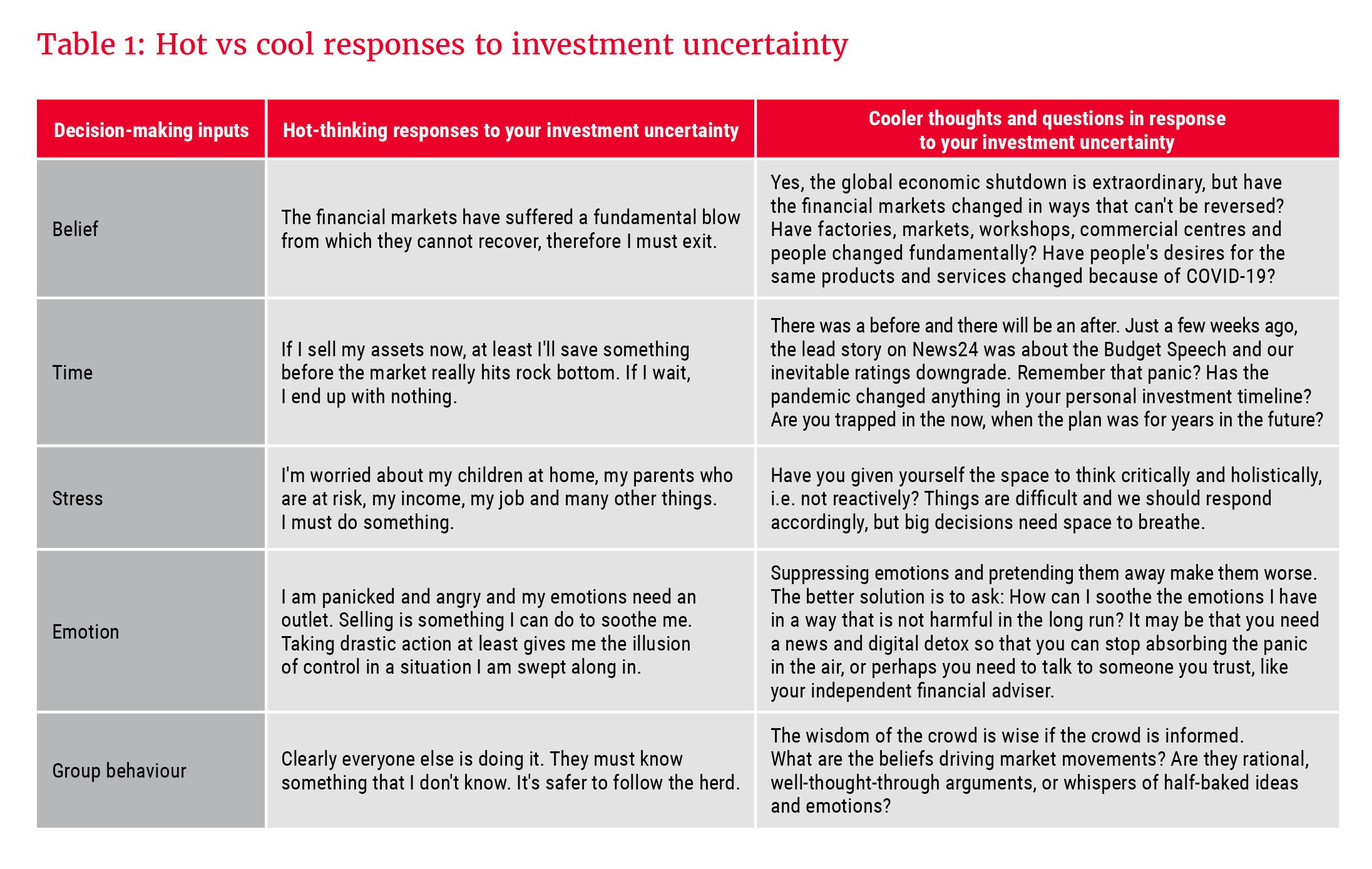The markets have plunged in the face of COVID-19. The temptation to disinvest and wait on the sidelines for things to improve is real. But is this a form of “hot thinking” that is best avoided? Nomi Bodlani discusses.
It is human nature to make decisions that are influenced by our emotions. Sometimes, this leads us to actions that protect and progress our well-being and that of the people and things we care about. However, when it comes to investing, acting too quickly on our emotions can have a devastating long-term impact on our portfolios.
The key to being a long-term investor is learning the art of blocking out the short-term market noise that can distract you from achieving your long-term investment goals. This can be difficult to achieve when you’re watching the market downturn negatively impacting your investments. The disappointment, fear and perceived loss may make you feel compelled to act. Although this is a natural reaction, it may not be the best course of action. There is another way of thinking through your options to decide your next best action – if any at all.
Behavioural scientists accept that emotion and decision-making often go hand in hand and that emotions can be a dominant driver in some of the most meaningful decisions in life. They refer to a certain type of thinking that happens under stress as “hot thinking”, and it is this inclination that leads us to react defensively. While hot thinking can help us act swiftly and automatically when we are in real and imminent danger or performing habitual tasks, it can lead to biased judgement and irrational decision-making outside of these circumstances, where shortcuts in processing are not required and are unhelpful.
When it comes to your investment portfolio, hot thinking is not a useful strategy. As counter-intuitive as it may seem, and as painful as it may feel, it is during times of crisis that the right decisions can enhance long-term returns.
Morgan Housel, a partner at the US venture capital firm Collaborative Fund, summed it up succinctly at the Allan Gray Investment Summit a few years ago, saying: “Volatility is not the biggest risk in investing. The biggest risk is the action that you take in response to that volatility. You think it is going to make you safe, but it actually injects substantially more risk into your investment portfolio.”
So what do you do with the disappointment, fear and perceived loss?
Slow down and reduce the heat. In sharp contrast to hot thinking, behavioural scientists refer to a second important system for processing information as “cold thinking”, or “slow thinking”. This is our ability to think and act in a deliberate, considered and controlled manner, i.e. to make decisions under circumstances of cool, level or moderate emotions.
While it may be difficult to imagine distancing yourself from the very real emotional responses elicited by current conditions, there are useful strategies you can apply to help you handle these feverish thoughts and carefully consider what actions to take – if any. If we approach the question of what to do with our investments by first understanding some of the features and responses of hot thinking, we may be able to think through our decisions more deliberately and ensure a better long-term outcome, as shown in Table 1.

Each of these thoughts and feelings may be easy to ignore in calmer times, but together – and with the frequency at which we see market graphs and big headlines with exclamation points – they make a compelling case for quick and reactive decision-making. Coupled with all the alone time we currently have to stare at screens and consume this panic, withdrawing from our investments may seem to make sense. But will this serve us over the long term? Distancing yourself from the very real emotions of disappointment, fear and perceived loss, and allowing yourself time to consider reliable sources of data, will help you answer this question.
Where to from here?
No one really knows what will happen next. As the pandemic spreads across the globe and a fever of panic and hot thinking follows, it's perhaps smart to remember that while our current disappointment and fear are real, we have within us the capacity for cooler thinking: to take a step back, evaluate reliable data and conclude with certainty that this, too, shall pass.